Ask a question from expert
Impact of Job Complexity and Performance on CFO Compensation
23 Pages5325 Words67 Views
Added on 2020-11-30
Impact of Job Complexity and Performance on CFO Compensation
Added on 2020-11-30
BookmarkShareRelated Documents
Running head: IMPACT OF JOB COMPLEXITY AND PERFORMANCE ON CFO COMPENSATION1Impact of Job Complexity and Performance on CFO CompensationStudent’s NameInstitutional Affiliation
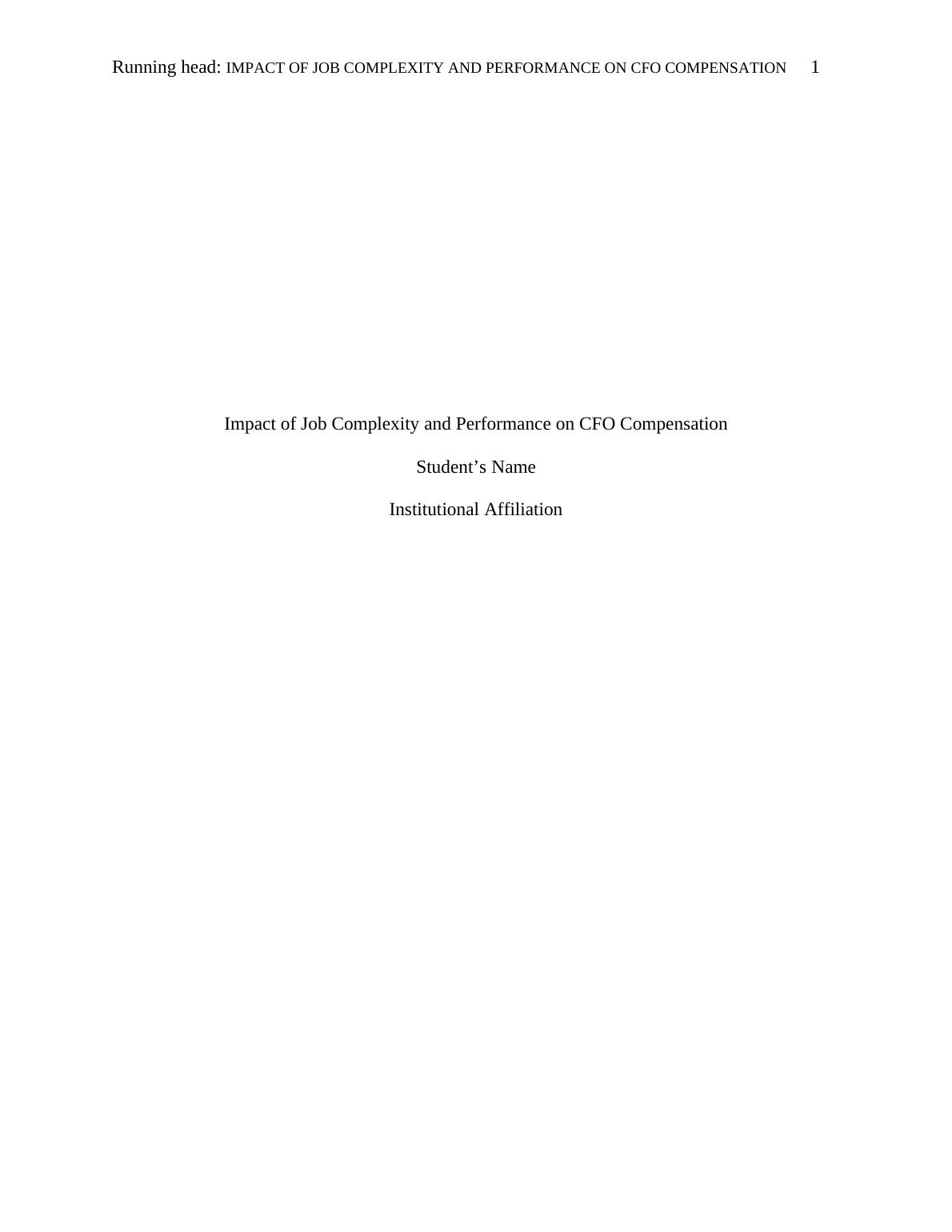
IMPACT OF JOB COMPLEXITY AND PERFORMANCE ON CFO COMPENSATION2AbstractThis research explores the effect on CFO performance from work difficulty and organization, as well as CFO-specific efficiency. We consider work difficulty, and overall company success all affects CFO compensation and bonus, while CFO-specific performance affects CFO bonus. Particularly, we note that CFOs are not just compensated when their companies hit or exceed profitability milestones, but they also get incremental benefits for manipulating profits and/or standards to allow their firms to achieve or even reach certain goals.Keywords: CFO compensation; job complexity; CFO performance; earnings targets; earnings management; expectations management.
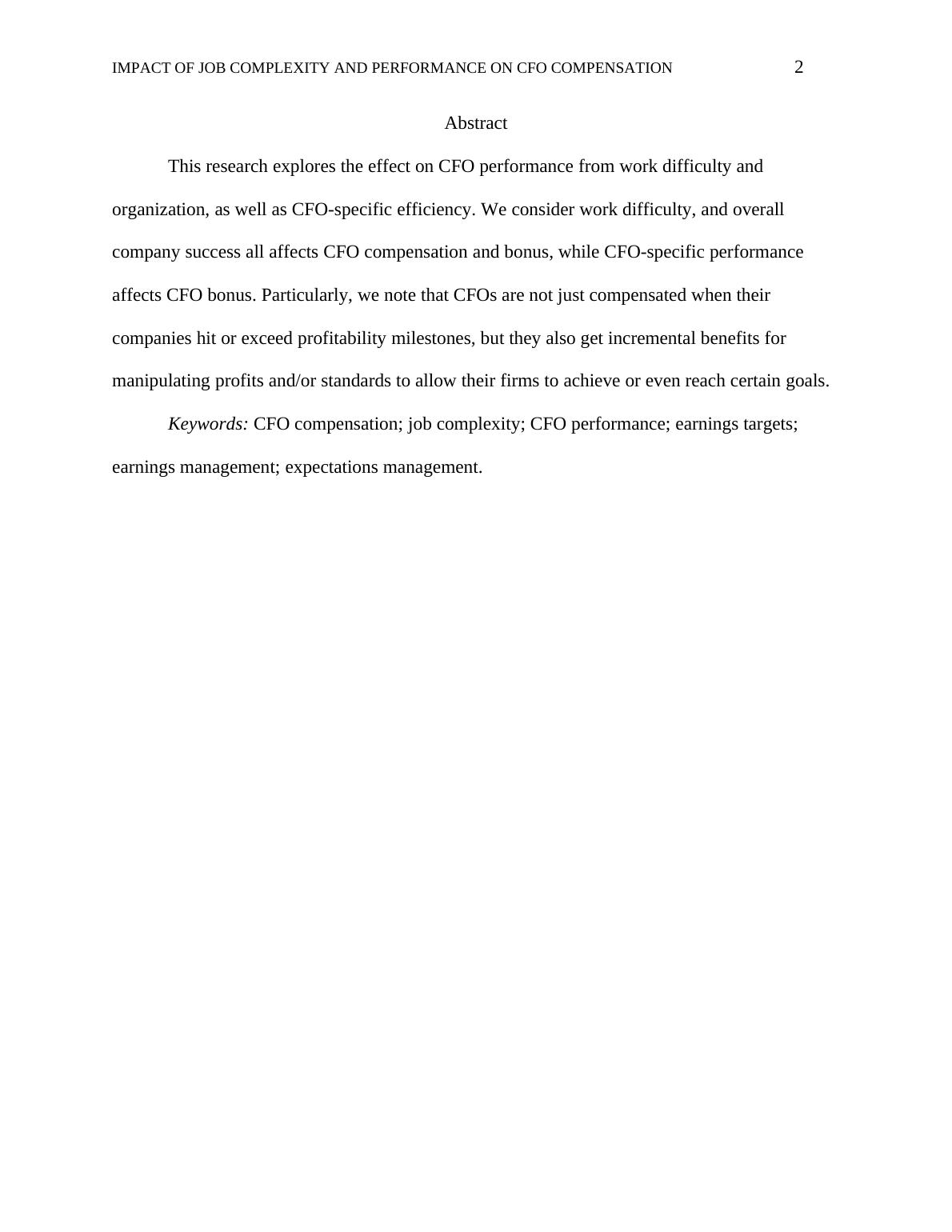
IMPACT OF JOB COMPLEXITY AND PERFORMANCE ON CFO COMPENSATION3Impact of Job Complexity and Performance on CFO CompensationINTRODUCTIONThe discovery of the CEO compensation determinants has long been an important research field among scientific researchers. Numerous studies and frameworks have been utilizedover the past few decades to analyze the cross-sectional interaction between CEO compensation and business (and industry) characteristics. These hypotheses and designs can be divided into four generic groups, at least. One group credits the substantial rise in pay for the Chief ExecutiveOfficer (CEO) in recent years to the universal acceptance by boards of directors and their compensation boards of market-based performance rewards programs. Such rewards schemes areexemplified by different types of shares, as well as short- and long-term bonus pay based on financial returns or the attainment of accounting-related performance targets.A second division reflects on the influence of enraptured management. In this viewpoint, powerful CEOs impose their control over small and inefficient boards to seize rentals from the company and in turn decide (in full or in part) their own level and pay system (Volpin, 2010). This rent extraction or so-called administrative control theory (Bebchuk, 2004) also assumes thatmost of the rent collection will take place by less visible and more difficult-to-value ways of compensation. A few of the mechanisms in which rent production will take place are equity shares, perquisites, insurance, and severance pay (Frydman, 2010). A third group of hypotheses holds the opposite perspective from the theory of managerialcontrol by arguing that the increase of CEO pay is the product of stronger corporate governance and increased oversight by boards and major shareholders of CEOs (Banker, 2005). These hypotheses assume that higher CEO compensation in equilibrium will be followed by higher reported CEO turnover on the market. However, as suggested by Edmans and Gabaix (2011), if
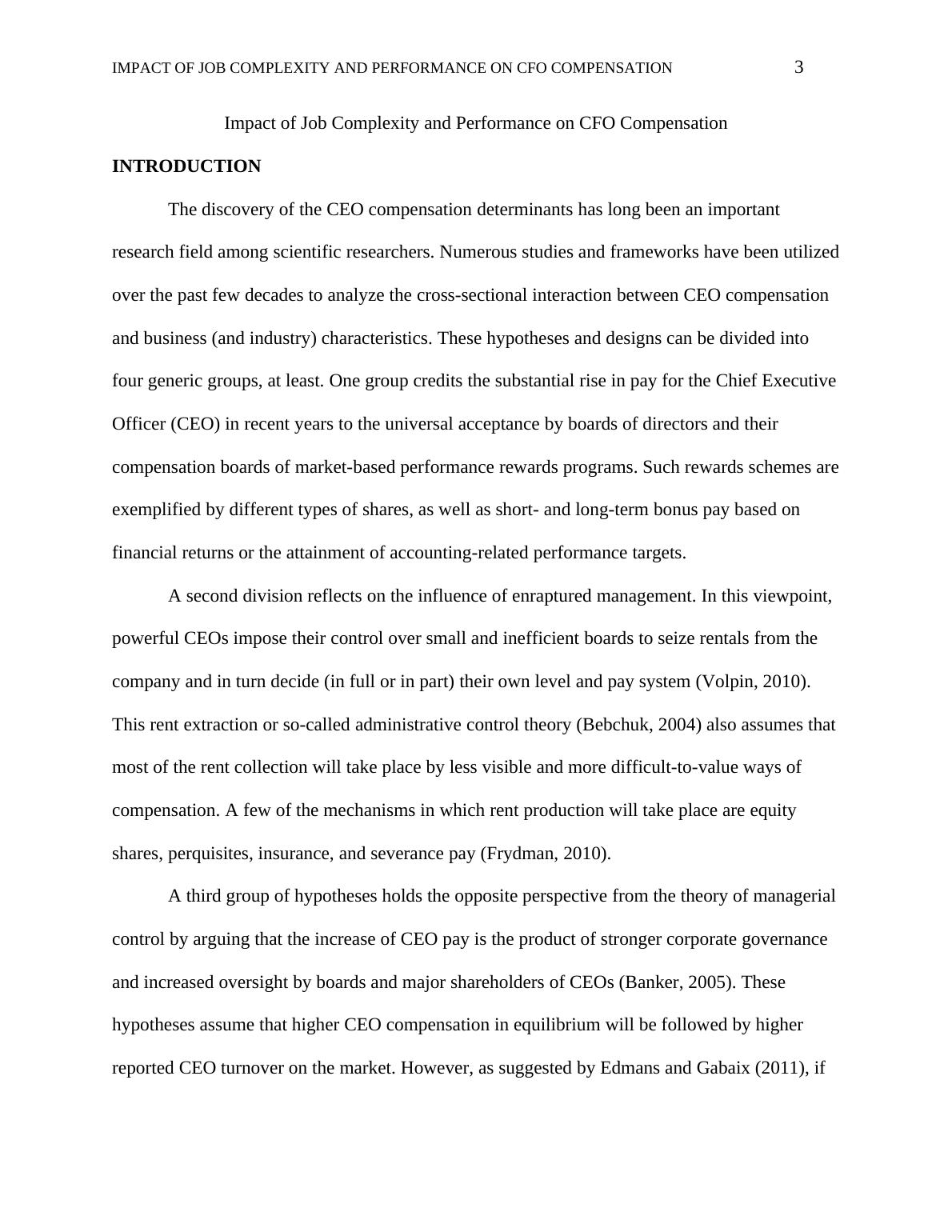
IMPACT OF JOB COMPLEXITY AND PERFORMANCE ON CFO COMPENSATION4the improvement of governance procedures often limits the collection of potential incentives open to sitting CEOs, it may be the case that an economy-wide enhancement of governance cannot lead to higher CEO pay. A fourth group of pay theory suggests that if labor markets become attractive for senior management, incentives should be transparent by assertive selection,resulting in a situation that the most skilled management will be hired by companies who would better use their particular talents and abilities to lead the company and succeed in the position of CEO (Van, 2012). Such companies should then be able to pay a premium for those skills. The CEOs are charged their reservation salary in equilibrium and rated graded by their talent — a kind of "best player" principle.In this article, we investigate the impact of work complexity and efficiency on CFO pay and note that CFOs are not only compensated on the basis of standard metrics of total company success (i.e. earnings and returns on stock), but are also compensated based on certain criteria that assess work complexity and efficiency(Banker, 2005). We consider that work sophistication is related to both gross and net CFO pay frameworks, while employee output is linked only to thecontingent compensation components, e.g. rewards. Focusing on CFO-specific results, we find that when the company matches or tops revenue expectations, CFOs get higher incentives. However, most importantly, our findings suggest that CFOs are gradually compensated insituations when a company achieves or only reaches its earnings goals whether they control revenue projections and/or budgetary accruals to better accomplish this outcome (Baber, 1994). This result is compatible with the extensive literature illustrating the significance of achieving profit targets, as well as the instrumental role of CFOs in allowing use of accounting flexibility to achieve those objectives.
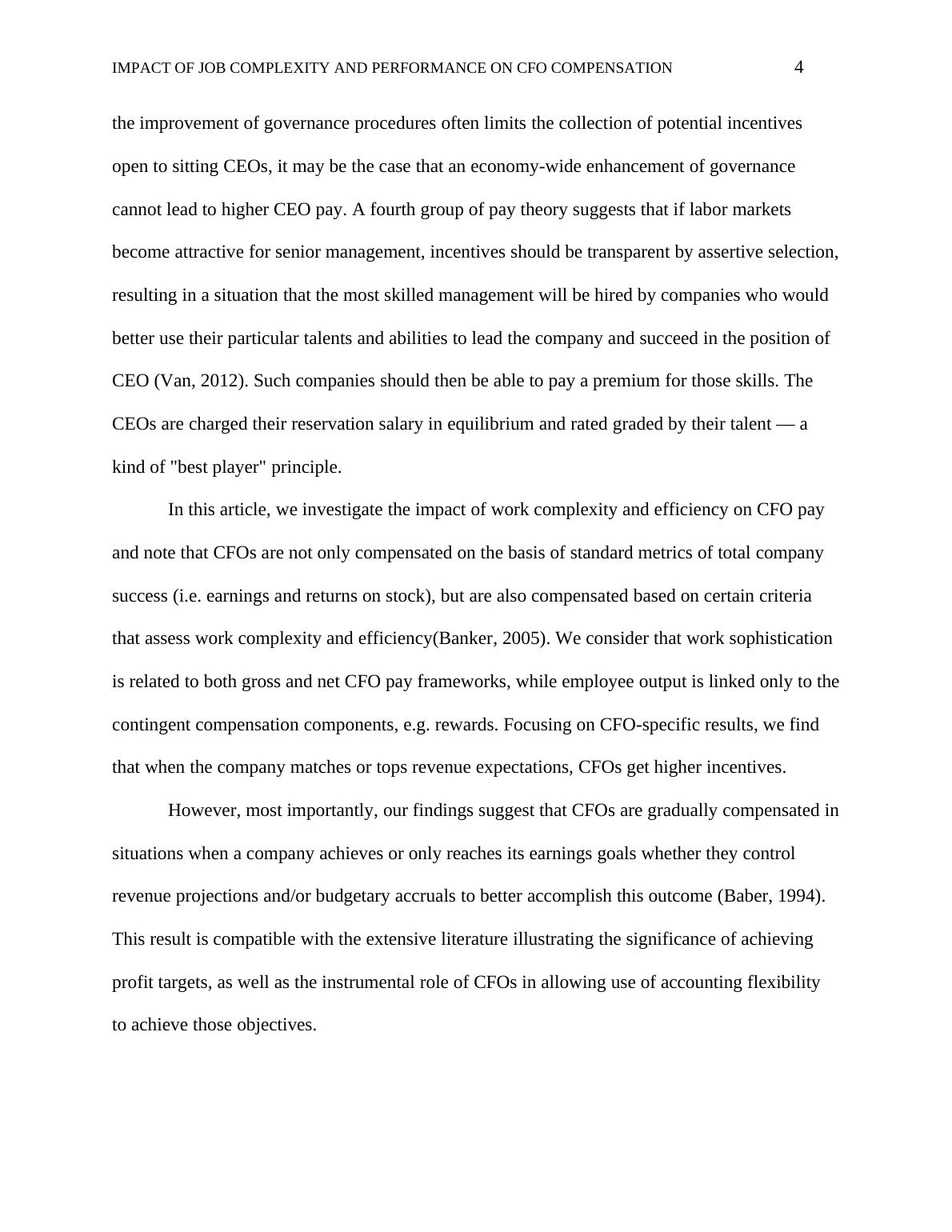
IMPACT OF JOB COMPLEXITY AND PERFORMANCE ON CFO COMPENSATION5The rest of this paper is structured according to the following. We review the literature in the next portion and establish our hypotheses. We define our sample and analysis process in the third section, and our analytical results in the fourth section. We finish on the fifth segment with a review of our observations.LITERATURE REVIEWWhile several of these hypotheses have achieved some popularity in the literature and seem to understand many of the cross-sectional variability in CEO compensation growth since the 2010-2015, no single hypothesis gives a detailed account of the compensation growth over even longer periods. An important paper by Frydman and Saks (2016) analyzes statistics on the CEO's pay for the period 2006 to 2014. Regarding the case of the "pay-for-performance" or incentive-based compensation hypothesis on why overall CEO compensation has so steadily increased since the 2000s, these scholars argue that although the wage level was lower before the2000s, the relationship between company success and pay was significant (DeYoung, 2013). Thus, although pre-2000 wage rates were smaller, the success compensation bonuses seemed to have already been in effect by that time. Moreover, since corporate governance activities are commonly accepted as poorer prior to the 2000s, proof of lower wage rates since this timeframe casts doubt on the reason for rent extraction or "managerial control theory." (Acharya, 2010). The favorable correlation between average CEO pay and average company sizeis to be expected, as the duties associated with overseeing and directing large diverse organizations usually require outstanding leadership and management skills. This point is in line with what we would call the "complexity hypothesis" of CEO pay, which relates recent rises in overall CEO pay levels to shifts in the design of the skills needed to operate today's larger and
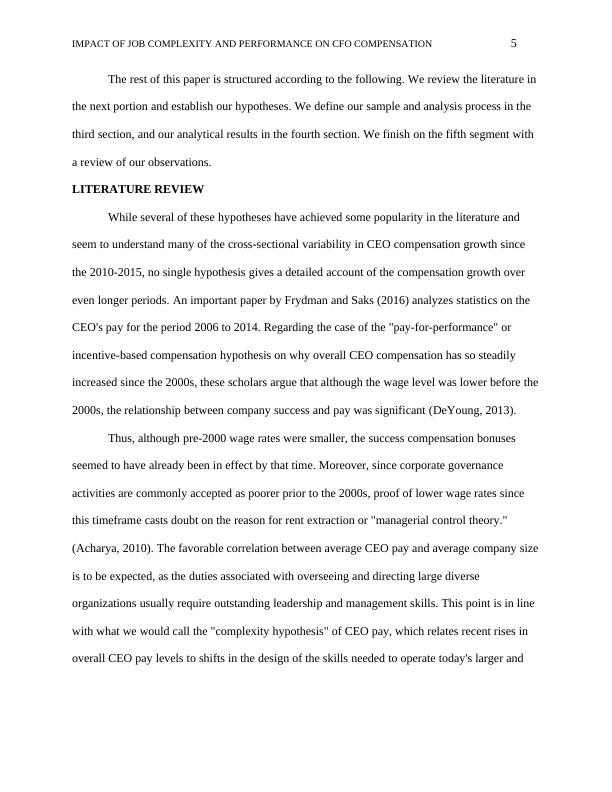
IMPACT OF JOB COMPLEXITY AND PERFORMANCE ON CFO COMPENSATION6more complex corporations — general management and leadership skills guided, for example, bybusiness globalization versus firm-specific skills or knowledge.Similarly, developments in firm technology and product markets over the past three decades have improved the relationship between CEO qualities (e.g., skill and leadership ability) and firm interest, with higher motivation with compensation rates as a result. Changes in company product distribution are also a major driver to CEO overall pay raises and a change in the incentive system. As seen by Berry et al. (2006) and consistent with the findings stated by Rose and Shepard (1997), CEOs of diversified firms — businesses competing in different commodity market segments — have higher rates of fixed pay, receive slightly more in salaries and incentives, and suffer greater turnover than CEOs of no diversified (focused single segment) firms. Frydman and Jenter (2010) note that an improvement in the business size (and complexity) raises the optimal amount of CEO effort, and thus opportunities, because the total result of CEO effort decreases with the company size (Himmelberg and Hubbard, 2000; Baker and Hall 2004). They also point out that management commitment and skill efficiency may have improved due to more vigorous rivalry due to globalization or penetration by international companies (Hubbard and Palia, 1995; Cunat and Guadalupe 2009a, 2009b), entrance by non-traditional rivals into historically secured markets (see, for example, DeYoung and Roland, 2001), advances in communications technologies. Lastly, moral hazard concerns can be more serious in larger companies, resulting in greater rewards for CEOs as businesses expand (Gayle and Miller, 2009) and regardless of their source, higher-powered opportunities must be balanced by higher rates of projected compensation to compensate managers for the increased risk of compensating them.
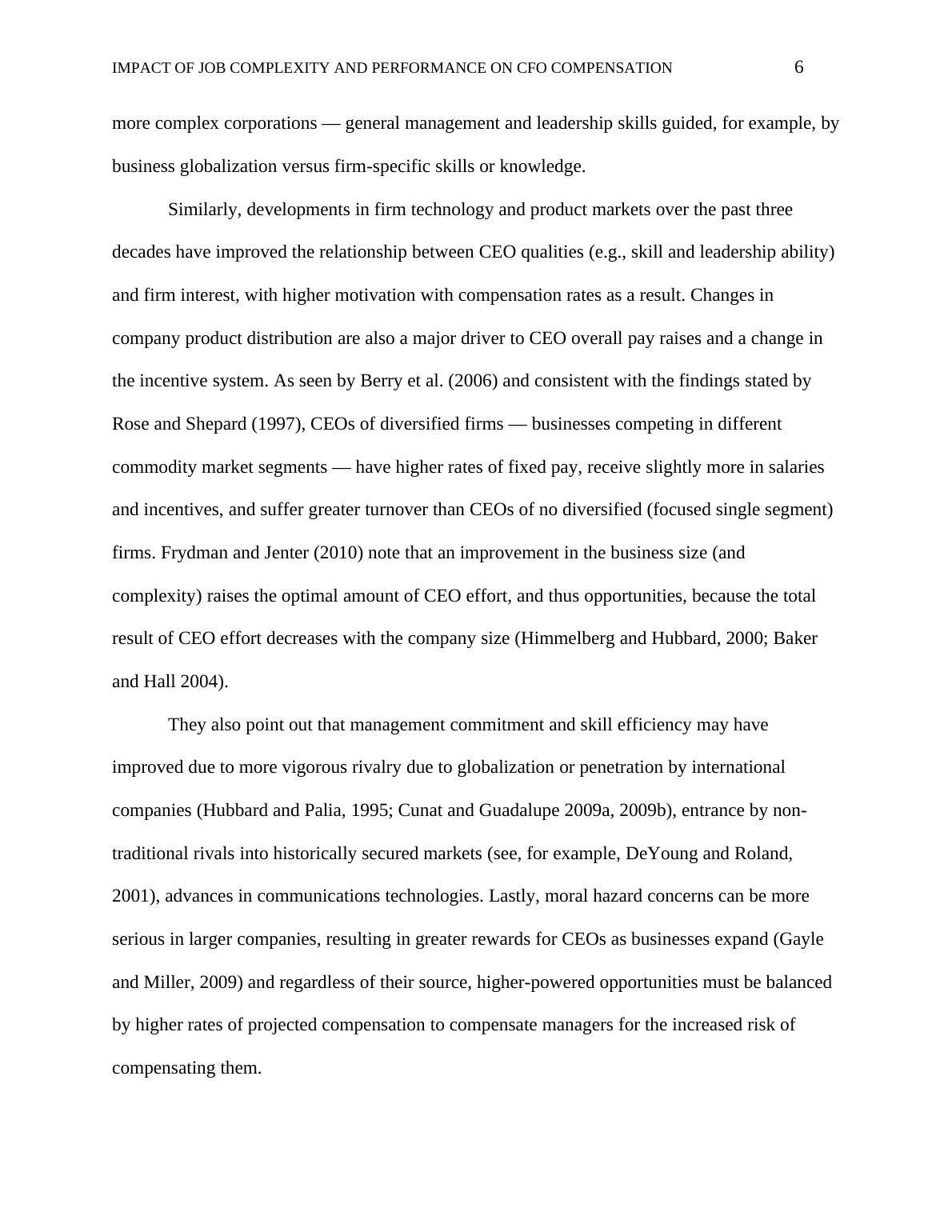
End of preview
Want to access all the pages? Upload your documents or become a member.
Related Documents
Global Financial crisis 2008 PDFlg...
|7
|1920
|130
CEO Compensation: Consequences and Effects on Agency and Equity Theorylg...
|8
|2016
|46
Talent Management TABLE OF CONTENTS TASK 51lg...
|12
|3944
|51
Unit 12 Organization and Behaviourlg...
|16
|4566
|47